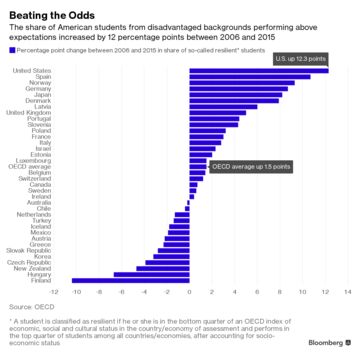School Leadership 2.0
A Network Connecting School Leaders From Around The Globe
Rich-Poor Achievement Gap Is Narrowing in American Education
Rich-Poor Achievement Gap Is Narrowing in American Education
The link between socio-economic status and school performance is weakening for U.S. students, a sign of improving equity in American education even as U.S. teens continue to lag behind their international counterparts in math, reading and science, according to a study by the Organization for Economic Cooperation and Development.

Between 2006 and 2015, the percentage of so-called resilient students in the U.S. – teens from the bottom of the socio-economic ladder who manage to outperform their peers and rank among the top quarter of students internationally – grew by 12.3 points, the largest margin of the 72 countries and economies surveyed.
Of course family wealth and background still influence academic achievement. Disadvantaged students in the U.S. were 2.5 times more likely to be low performers than advantaged students last year, according to the OECD report released Tuesday. But the correlation is decreasing. In 2015, 11 percent of the variation in American students’ test scores could be explained by their socio-economic status. That's down from 17 percent a decade ago, suggesting that education outcomes are increasingly the result of students’ abilities and effort rather than their personal circumstances and family background.
While equity has improved, the gains among disadvantaged students were not large enough to increase the nation's overall performance in different subject areas. Out of 35 OECD countries, the U.S. ranked 19th in science, 20th in reading and 31st in math as Asian countries including Singapore and Japan once again topped the charts. While mean performance in science and reading has remained essentially unchanged since previous assessments, math performance in the U.S. fell significantly between 2012 and 2015.
The report cited Canada, Estonia, Germany and Hong Kong as role-model countries or regions that have succeeded in achieving both high levels of performance and equity in education outcomes.
Among a host of policy recommendations, the authors highlight early childhood education to prevent under-served children from falling behind their peers during their early years and higher teacher salaries to attract the best educators to the most disadvantaged schools.
The report comes at a potential turning point in U.S. education policy as President-elect Donald Trump assembles his cabinet. His pick for education secretary, Betsy DeVos, advocates school vouchers – letting students use public money to attend private schools – and she opposes the Common Core standards devised in 2010 to align and raise benchmarks for learning across the country.
Trump has vowed to abolish Common Core, calling the guidelines a "total disaster" in a campaign ad, and proposes a $20 billion federal voucher program for impoverished children that he would pay for by "reprioritizing existing federal dollars," according to a position statement on his website.
Tags:
Replies to This Discussion
JOIN SL 2.0
SUBSCRIBE TO
SCHOOL LEADERSHIP 2.0
Feedspot named School Leadership 2.0 one of the "Top 25 Educational Leadership Blogs"
"School Leadership 2.0 is the premier virtual learning community for school leaders from around the globe."
---------------------------
Our community is a subscription-based paid service ($19.95/year or only $1.99 per month for a trial membership) that will provide school leaders with outstanding resources. Learn more about membership to this service by clicking one of our links below.
Click HERE to subscribe as an individual.
Click HERE to learn about group membership (i.e., association, leadership teams)
__________________
CREATE AN EMPLOYER PROFILE AND GET JOB ALERTS AT
SCHOOLLEADERSHIPJOBS.COM
New Partnership
Mentors.net - a Professional Development Resource
Mentors.net was founded in 1995 as a professional development resource for school administrators leading new teacher induction programs. It soon evolved into a destination where both new and student teachers could reflect on their teaching experiences. Now, nearly thirty years later, Mentors.net has taken on a new direction—serving as a platform for beginning teachers, preservice educators, and
other professionals to share their insights and experiences from the early years of teaching, with a focus on integrating artificial intelligence. We invite you to contribute by sharing your experiences in the form of a journal article, story, reflection, or timely tips, especially on how you incorporate AI into your teaching
practice. Submissions may range from a 500-word personal reflection to a 2,000-word article with formal citations.